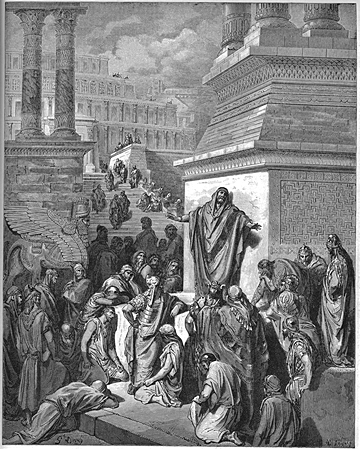Jonah 3
1 Then Yahweh said to Jonah again,
Pea naʻe toe hoko mai ʻae folofola ʻa Sihova kia Siona, ko hono liunga ua, ʻo pehē,
2 “Go to that great city of Nineveh, and tell them the message that I gave you [previously].”
“Tuʻu hake, pea ke ʻalu ki Ninive, ʻae kolo lahi ko ia, pea ke malangaʻaki ʻi ai ʻae lea te u fekau kiate koe.”
3 So [this time] Jonah obeyed Yahweh, and he went to Nineveh. That city was so big that a person [had to walk] for three days to completely [go through] it.
Ko ia ne tuʻu hake ai ʻa Siona, pea ne ʻalu ki Ninive, ʻo hangē ko e folofola mai ʻa Sihova. Pea ko Ninive ko e fuʻu kolo lahi ʻaupito ia, ʻo feʻunga mo e fononga ʻi he ʻaho ʻe tolu.
4 On the first day [after] Jonah [arrived], he [began walking] through the city. He was proclaiming (OR, At the end of that day he started proclaiming) to the people, “Forty days from now, Nineveh will be destroyed {[God] will destroy Nineveh}!”
Pea naʻe kamata hū ʻa Siona ki he kolo ʻi he fononga ʻoe ʻaho ʻe taha, mo ʻene kalanga ʻo pehē, “ʻOku toe ʻae ʻaho ʻe fāngofulu, pea ʻe fakaʻauha ʻa Ninive.”
5 The people of Nineveh believed God’s [message]. They [all] decided that everyone should begin (fasting/abstaining from food). So [everyone], including important people and unimportant people, [did that]. They [also] put on coarse cloth, [to show that they were sorry for having sinned].
Ko ia naʻe tui ai ʻae kakai ʻo Ninive ki he ʻOtua, pea fanongonongo ʻae ʻaukai, mo nau ai ʻae tauangaʻa, ʻo fai mei he kakai māʻolunga ʻo aʻu kiate ia naʻe siʻi hifo taha ʻiate kinautolu.
6 The King of Nineveh heard [what the people were doing]. [So] he took off his royal robes, and [he also] put on coarse cloth. He left his palace, and sat down where there were [cold] ashes, [to show that he also was sorry for having sinned].
He naʻe ʻomi hono fakahā ki he tuʻi ʻo Ninive, pea ne tuʻu hake ia mei hono nofoʻanga, ʻo ne toʻo hono kofu tōtōlofa mo ne kofuʻaki ʻe ia ʻae tauangaʻa, pea nofo ki lalo ʻi he efuefu.
7 Then he sent messengers to proclaim to [the people in] Nineveh: “My advisors and I have decreed that no one may eat or drink anything. Do not even allow your animals to eat or drink.
Pea naʻa ne fekau ke fanongonongo mo fakahā ʻi Ninive, kuo fono ʻae tuʻi mo ʻene houʻeiki, ʻo pehē, “ʻOua naʻa kamata ha meʻa ʻe ha taha pe ʻe ha manu, ʻe he tauhi, pe ʻe ha fanga manu: ʻoua naʻa nau kai pe te nau inu ha vai
8 Instead, every person must put on coarse cloth. [Put coarse cloth on] your animals, [too]. Then everyone must pray fervently to God. And everyone must stop doing evil actions/things, and stop acting violently [toward others].
Kae tuku ke kofuʻaki ʻae tauangaʻa ʻe he tangata, pea mo e manu, pea tangi fakamanavahē ki he ʻOtua: ʻio, ke tafoki taki taha kotoa pē mei hono hala kovi, pea mei he fakamālohi ʻoku ʻi honau nima.
9 Perhaps, [if everyone does that], God may change his mind and be merciful [to us], and stop being very angry with us, with the result that we will not die.”
Ko hai ʻoku ʻilo, naʻa ʻe liliu, pea fakatomala ʻae ʻOtua mo ne fakatafoki atu ʻae kakaha ʻo hono houhau, koeʻuhi ke ʻoua naʻa tau ʻauha?”
10 When they [all did that], God saw what they were doing, and he saw that they had stopped doing evil things. So [he pitied them, and] he did not get rid of them as he had threatened to do.
Pea naʻe ʻafio ʻe he ʻOtua ki heʻenau ngāue, kuo nau tafoki mei honau hala kovi: pea naʻe liliu ʻae ʻOtua mei he kovi ʻaia naʻa ne pehē te ne fakahoko kiate kinautolu; pea naʻe ʻikai te ne fai ia.





















